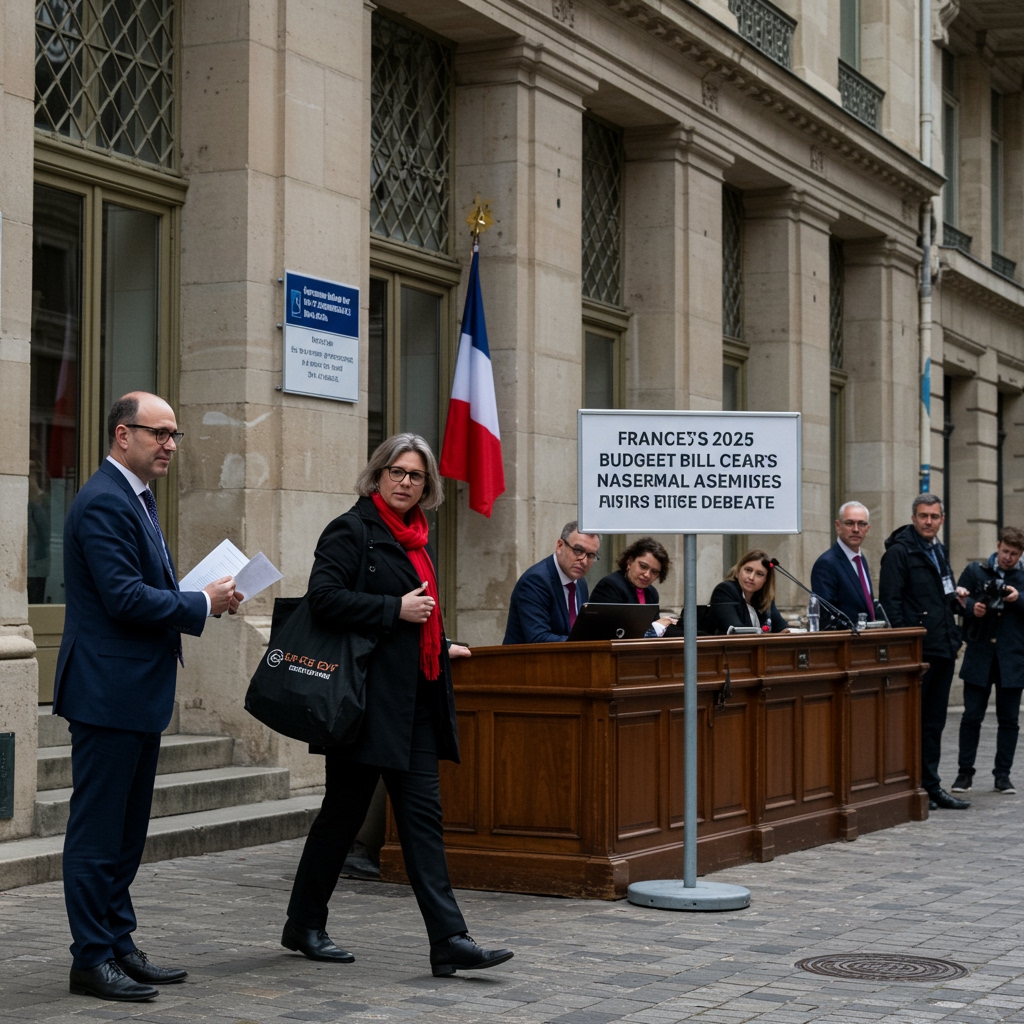French National Assembly Approves Contentious 2025 Budget Bill by Narrow Margin
The French National Assembly concluded its legislative review of the government’s proposed budget bill for the year 2025 on January 24th, delivering a critical, albeit closely contested, victory for the executive. The final vote on this significant financial legislation saw its passage by a narrow margin, following an intense period marked by prolonged debates and multiple procedural challenges initiated by various opposition parties within the chamber. The approval of the bill is a pivotal step in President Emmanuel Macron’s reform agenda, signaling the government’s intent to push forward with key policy priorities despite a lack of a strong absolute majority in the Assembly.
The Legislative Process: Turmoil and Triumph
The passage of the 2025 budget bill was anything but smooth. The legislative journey through the French National Assembly was characterized by a political climate of deep division and robust opposition. From the moment the bill was introduced, it became the subject of intense scrutiny and often heated exchanges between the government majority and minority parties. The process unfolded over several days, consuming considerable parliamentary time and energy. Opposition parties, utilizing various procedural tools available to them under the Assembly’s rules, mounted multiple challenges aimed at delaying, amending, or ultimately blocking the legislation. These maneuvers included procedural motions, amendments in the thousands, and vigorous floor debate questioning the bill’s underlying assumptions, expenditure priorities, and revenue projections. Despite these significant headwinds and the determined efforts of the opposition to disrupt its progress, the government ultimately succeeded in securing enough votes to pass the bill on its final reading. The narrow margin of victory underscores the delicate balance of power within the Assembly and highlights the challenges the government faces in enacting its agenda without broader cross-party consensus or a more substantial parliamentary majority. The outcome reflects the government’s capacity to mobilize its own ranks and secure necessary support from allied factions, navigating the complexities of a fractured political landscape to advance its core legislative priorities.
Key Provisions: Charting a Course for Modernization
The approved budget bill for 2025 contains several key provisions that the government asserts are vital for the future economic trajectory and environmental commitments of France. Among the most prominent features are significant new investments earmarked for the expansion and enhancement of renewable energy infrastructure. This commitment aligns with France’s national and European-level climate targets, aiming to accelerate the transition away from fossil fuels and build a more sustainable energy future. The investments are intended to support projects ranging from large-scale solar and wind farms to improvements in grid connectivity and energy storage technologies. Complementing these environmental investments are substantial allocations directed towards digital technologies. Recognizing the increasing importance of the digital economy and technological innovation, the budget includes funding aimed at boosting France’s capabilities in areas such as cybersecurity, artificial intelligence, digital public services, and support for tech startups and digital transformation across various sectors. These investments are portrayed by the government as essential for maintaining France’s competitiveness in a rapidly evolving global landscape and ensuring the country is at the forefront of future technological advancements.
In addition to these forward-looking investment areas, the budget bill also incorporates measures specifically designed to impact the business environment. These include provisions aimed at streamlining business regulations. The government argues that reducing bureaucratic hurdles and simplifying administrative procedures will foster a more favorable climate for businesses to operate, invest, and create jobs. The specifics of these regulatory changes are detailed within the bill’s extensive text, targeting areas identified as sources of unnecessary complexity or burden for companies, particularly small and medium-sized enterprises. The combination of strategic investments in green and digital technologies alongside efforts to ease regulatory burdens forms the core economic strategy underpinning the 2025 budget, reflecting the government’s dual focus on driving innovation and improving the ease of doing business in France.
Government’s Stance: Crucial for Progress
The French government has consistently presented the 2025 budget bill as a piece of legislation that is crucial for the nation’s progress on multiple fronts. Officials have argued that the bill is indispensable for achieving economic modernization, stating that the targeted investments in renewable energy and digital technologies are necessary preconditions for France to remain competitive and adaptable in the 21st century global economy. The emphasis on streamlining business regulations is also framed within this modernization narrative, aimed at unlocking entrepreneurial potential and stimulating growth. Furthermore, the government has strongly linked the budget bill to France’s commitment to meeting climate targets. The significant investments in renewable energy infrastructure are specifically cited as a critical component of the national strategy to reduce carbon emissions and transition towards a low-carbon economy in line with domestic laws and international agreements. The government’s messaging has been clear: this budget is not merely an accounting exercise, but a strategic blueprint designed to equip France with the tools and infrastructure needed to tackle the economic and environmental challenges of the coming years.
Opposition Engagement and Political Fallout
As noted, the passage of the bill followed intense debate and multiple procedural challenges from opposition parties. While the summary does not detail the specific nature of every challenge or the arguments made by each opposition group, their actions underscored significant political disagreement regarding the government’s priorities, spending choices, and overall economic direction outlined in the 2025 budget. The narrow margin of the final vote is a direct consequence of this strong opposition. It demonstrates the government’s dependency on navigating complex alliances and securing every possible vote, highlighting the political fragility inherent in legislating without a clear majority. The debates brought to light differing visions for France’s future, particularly concerning the pace and method of energy transition, the scale and focus of digital investment, and the perceived impact of regulatory changes on various sectors and citizens. The vigorous engagement from opposition benches, though ultimately unsuccessful in preventing the bill’s passage, ensured that the legislation was subjected to rigorous public and parliamentary scrutiny, forcing the government to defend its proposals comprehensively throughout the process.
The Path to Law: Presidential Signature Awaited
With its approval secured in the French National Assembly on January 24th, the 2025 budget bill has completed a crucial phase of the legislative process. The bill’s journey does not end here, however. The next and final step in formalizing the legislation is to send it to President Emmanuel Macron for signature. The President’s signature is the act that formally promulgates the law, making it legally binding and effective across the country. This step is typically a formality once a bill has cleared parliament, particularly for government-backed legislation like the annual budget. Upon receiving the signed bill, it will be published in the Official Journal of the French Republic, at which point its provisions officially enter into force according to the timeline stipulated within the law itself. The successful passage through the Assembly, despite the considerable political hurdles, marks a significant achievement for the government, clearing the path for the budget outlined in the bill to become the financial framework for France in 2025, enabling the planned investments in renewable energy infrastructure and digital technologies, and implementing the measures aimed at streamlining business regulations as intended.





